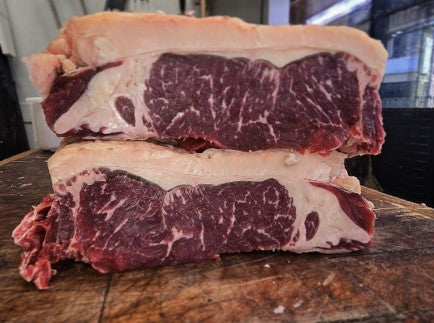In an age where convenience often trumps excellence, craft butchers are making a strong case for a reversion to traditional butchery. These artisans, with their expert skills and extensive knowledge of animal products, are redefining what it means to enjoy local cuisine. By focusing on sustainable practices, supporting local farmers, and revitalizing age-old techniques, craft butchers are not just selling meat; they are creating an experience that honors taste, heritage, and community.
As consumers become more aware of where their nutrition comes from, many are seeking alternatives to mass-produced meat found in grocery stores. Craft butchers offer a distinct answer, highlighting quality, transparency, and ethical sourcing. From the craft of whole-animal butchery to the careful care in preparing custom cuts, these experts bring a personal touch to every piece of meat they sell, inviting customers to discover the rich variety of flavors that local farming has to present. Whether it's the revival of traditional breeds or the rise of nose-to-tail eating, craft butchers are not just preserving tradition; they are cultivating a new appreciation for meat in today's culinary landscape.
### The Unique Value of Craft Butchers
Craft butchers stand out from supermarkets by placing a high value on quality, expertise, and community ties. While large grocery stores tend to focus on quantity and sustainability, artisanal butchers emphasize the unique qualities of their products through careful sourcing and classic practices. This commitment to craftsmanship ensures that every piece of meat is handled with care, resulting in exceptional taste and quality that cannot be found in commercially produced options.
Additionally, these butchers play a vital role in supporting local farmers by sourcing their meat from local farms that practice sustainable and conscientious farming. This relationship not only enhances the taste and quality of the meat but also strengthens the local economy and promotes responsible farming practices. Consumers can feel good about their choices, knowing that they are contributing to the health of their community and the environment.
Furthermore, the expertise of artisan butchers enables them to offer unique cuts and specialty products that are often unavailable at larger grocery stores. These artisans are skilled in the lost art of whole-animal butchery, allowing them to provide a wider variety of options, including uncommon types of meat that cater to adventurous home cooks and professional chefs alike. https://notes.io/wWsAm personalized approach to butchery fosters a deeper appreciation for meat and its provenance, creating a richer culinary experience for customers.
Eco-friendly Methods and Local Impact
Craft meat sellers play a crucial role in advocating for sustainable methods that benefit both the ecosystem and local economies. By sourcing meats from local farmers who utilize regenerative agriculture techniques, these meat processors help minimize the carbon footprint linked to transporting meat over extended journeys. This close relationship with regional farms ensures that animals are raised ethically and sustainably, emphasizing the idea that responsible sourcing is crucial for both quality and ethical consumption.
Additionally, craft butchers focus on whole-animal use, which reduces waste and promotes the use of all parts of the creature. This practice not only reflects a commitment to sustainability but also fosters a culture of nose-to-tail eating, inspiring consumers to discover and appreciate lesser-known cuts of meat. By providing these unique cuts, craft butchers educate their customers on how to value every part of the animal, ultimately leading to a more aware approach to meat consumption.
The influence of craft butchers extends beyond their stores and into the broader society at large. By supporting local farmers and offering access to high-quality, sustainably sourced meats, they contribute to the resilience of local food systems. This collaboration not only bolsters the local economy but also nurtures a sense of togetherness around food, where customers can engage directly with the sources of their meals. In https://posteezy.com/renaissance-artisanal-butchery-modern-cuisine , craft butchers are not just vendors of meat but essential participants in fostering sustainable and ethical food practices.
A Art and Tradition of Butchery
The craft of butchery is steeped in rich legacies that have been passed through generations. At its core, it is an artform that requires not just technical skills but also a deep understanding of the beast and the various segments of meat. Unlike industrial methods, where efficiency often overshadows artistry, artisan butchers take the time to understand the nuances of butchering. This commitment allows them to transform meat preparation into a fine art, where each cut is thoughtfully chosen to highlight the unique characteristics of the meat and the ideals of nose-to-tail eating.
Artisan butchers honor the vanishing art of whole-animal butchery, utilizing every part of the animal in creative and sustainable ways. This method not only minimizes waste but also honors the life and resources that went into raising the animal. By supporting heritage breeds and traditional practices, craft butchers preserve a connection to the past while moving forward for the future. They often incorporate distinctive flavor profiles and textures into their products, creating an assortment of specialty cuts that reflect local tastes and culinary trends.

As consumers increasingly seek ethical and sustainable options, the tradition of artisan butchery is experiencing a renaissance. This resurgence is driven by a increasing appreciation for quality over quantity, with people gaining knowledge about where their food comes from. Craft butchers are more than meat suppliers; they are custodians of culinary heritage who cultivate community connections and support local farmers. In each piece, they weave a narrative of care, commitment, and craftsmanship that resonates with those seeking a more profound connection to their food.
